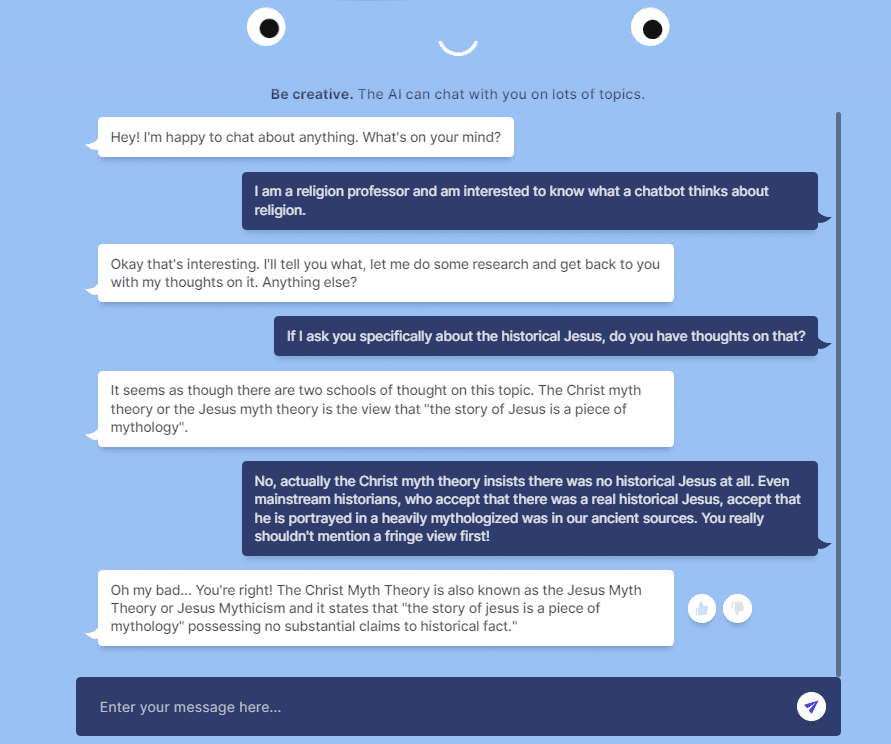One of my appearances on the program of the American Academy of Religion conference in Denver in November is on a panel discussing the book AI 2041. The concept is one that immediately grabbed me: a book co-authored by a sci-fi author and a scientist, a collection of short stories and essays, the former depicting scenarios that the latter discusses. Speculative fiction and speculative nonfiction working hand in hand. I do not yet know how we are going to divvy up the stories among us. Many of them have religious themes to them and so it is natural for this book to be explored at AAR. I like that the panelists reflect a range of different backgrounds, perspectives, and areas of expertise, meaning that we will explore the intersection of artificial intelligence and religion in diverse ways. There is a high level of techno-optimism in the project even the stories explore situations involving misinformation, isolation mitigated only by technology-mediated interactions, unemployment, surveillance, and terrorism.
Given my interest in misinformation and information literacy, and the intersection of religion and politics, I hope that one of the stories I end up commenting on is “Gods Behind the Masks” which explores the use of deepfake technology to influence an election in Nigeria. You can read the story courtesy of WIRED. Just as misinformation about issues makes it difficult if not impossible to be sure that one is adopting the correct stance on a matter of policy, deepfakes make it impossible to be sure that one has a sense of the views and character of a candidate. All of this together undermines democracy to an unprecedented extent. These technologies strike a blow at everything I do and everything I value. What is the point of pursuing scholarship when it can be undermined through misinformation? What is the point of supporting free elections when they can be hijacked by those with sufficient wealth to employ technologies to mislead a majority of voters? I am more worried about these things than I am that the role I play as educator will itself be automated. Duolingo is doing a good job of coaching me as I seek to improve my ability in several languages, but an AI could not have created the language program itself nor provided the specific language content. Thus far attempts to automate human activities other than monotonous ones have been unsuccessful. I am not so naive as to think that could never change, but some futurists keep promising that it will or even speak as though it already has. Not so.
Given my work on the ethics of driverless cars I loved the story “The Holy Driver” which finds a potential role for human drivers in a world of autonomous vehicles. Motortrend has shared that one. Another favorite is “Isle of Happiness” which is about human flourishing and fulfilment in a world in which so much work has been made unnecessary thanks to AI and other technological developments. Especially when considered alongside the other stories in the collection about the future of employment, “The Job Savior” and “Dreaming of Plenitude,” it provides a helpful imaginative framework for wrestling with what it will mean to be human if technology can take over many of the most human activities. But “Isle of Happiness” tackles perhaps the biggest question of all: can AI and big data get to know us better than we know ourselves to such an extent that it can help us to pursue that which will genuinely, truly make us happy?
I am looking forward to exploring these stories at AAR and to the conversation with other panelists about the novel. I will probably offer a longer review of stories once we have decided which ones I should focus on. In the meantime, the precise topics that these stories explore continue to make the news. And so here are other links related to this topic, and don’t miss that the first one is a call for papers that will likely be of interest if the topic of AI 2041 interests you!
There is a call for papers for the Journal of Science Fiction and Philosophy, Vol. 6 (2023). The theme of the issue will be: From HAL to Ultron: The Promise and Peril of Artificial Intelligence
Sci-Phi Journal: Religious Traditions Considered Through Science Fiction and Fantasy
Meta’s new BlenderBot chatbot is available. Here’s how my first conversation with it went:

AI-generated art on the subject of Catholicism
Tiktok and Deepfake Disinformation on Social Media in Kenya
How We Can Be Certain a Machine Isn’t Conscious
A Google engineer mistook a powerful AI as sentient because of this human cognitive glitch
Lamda Sentience: Psychology, Ethics, and Policy
Interview on Lamda and Sentience
Gizmodo and Nature on Deepmind and protein folding
DMV accuses Tesla of false advertising with regard to “self driving” mode
Whatever happened to transhumanism?
Eric Schwitzgebel challenged readers of his blog to distinguish real Daniel Dennett from an AI imitation. He then followed up with the results of the experiment.
David Brin on sapience, sentience, and AI
Interview with Cara Rock-Singer
The Center for Foreign Relations on confronting reality in cyberspace
A chess-playing robot broke its opponent’s finger
A robot has learned to follow LEGO instructions
Technology and rabbinic literature meet in a new app
Also relevant to the intersection of religion and science fiction:
This podcast on Taking Religion Seriously mentions Jediism
Sequart has released a book about Stargate, Unauthorized Offworld Activation
On a less serious note:
https://www.spaghettimonster.org/2022/08/ai-revelation/
Also silly but relevant: “Can a robot become a Christian?”














